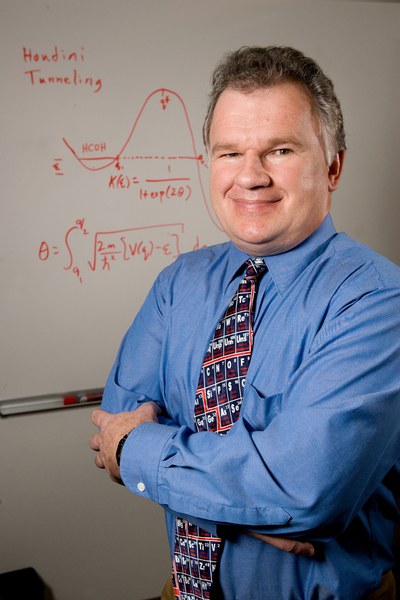Focus on interactions between molecules: U.S. chemist complements the Giessen team
Prof. Wesley D. Allen is Mercator-fellow in the DFG priority program “dispersion” at JLU
No. 144e • July 17, 2015
The objective of the research team is to better understand London dispersion interactions – the attractive forces between molecules or atoms – in molecular systems, to quantify those forces and to specifically use them. Because individual London forces are weak, they have long been underestimated. However, their collective behavior provides a fundamental driving force of molecular aggregation and account for the unusual stability of many molecules. Among other phenomena, London dispersion plays a central role in identifying molecules, in chemical selectivity through the stabilization of transition states during chemical reactions, in protein folding and in enzyme catalysis.
Wesley D. Allen, born in 1961, studied chemistry and physics at Vanderbilt University in the southern USA. In 1987 he completed his PhD in theoretical chemistry at the University of California, Berkeley and subsequently worked as a Postdoctoral Research Associate at Sandia National Laboratories in Livermore, California. Between 1988 and 1994 Allen was Assistant Professor in the Department of Chemistry at Stanford University before he transferred to the University of Georgia in 1995, where he began to work as Senior Research Scientist at the Centre for Computational Chemistry and later became Associate Professor in the Department of Chemistry. Allen has received numerous awards for his work, including the Creative Research Medal of the University of Georgia. Through various scientific collaborations, he is internationally networked and was visiting professor at JLU in 2004 within the framework of the Liebig-College, which is funded by the German state of Hessen.
Prof. Allen’s research focuses on theoretical development and chemical applications of molecular quantum mechanics. He is going to stay at JLU until the end of July.
- Further information
www.uni-giessen.de/cms/fbz/fb08/dispersion
- Contact
Prof. Dr. Peter R. Schreiner
Institute of Organic Chemistry
Justus-Liebig University Giessen
Heinrich-Buff-Ring 58
35392 Giessen, Germany
phone: +49 641 99-34300
